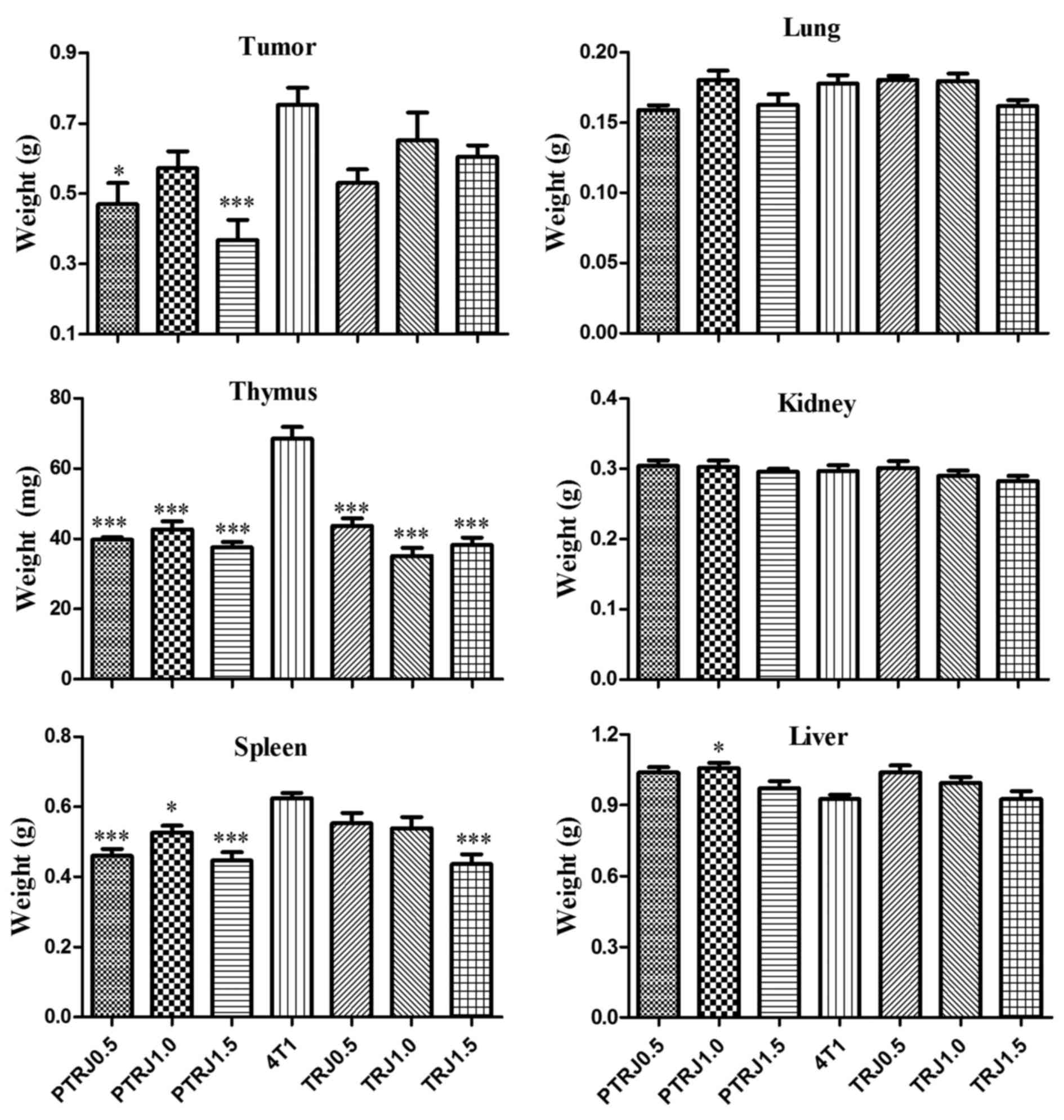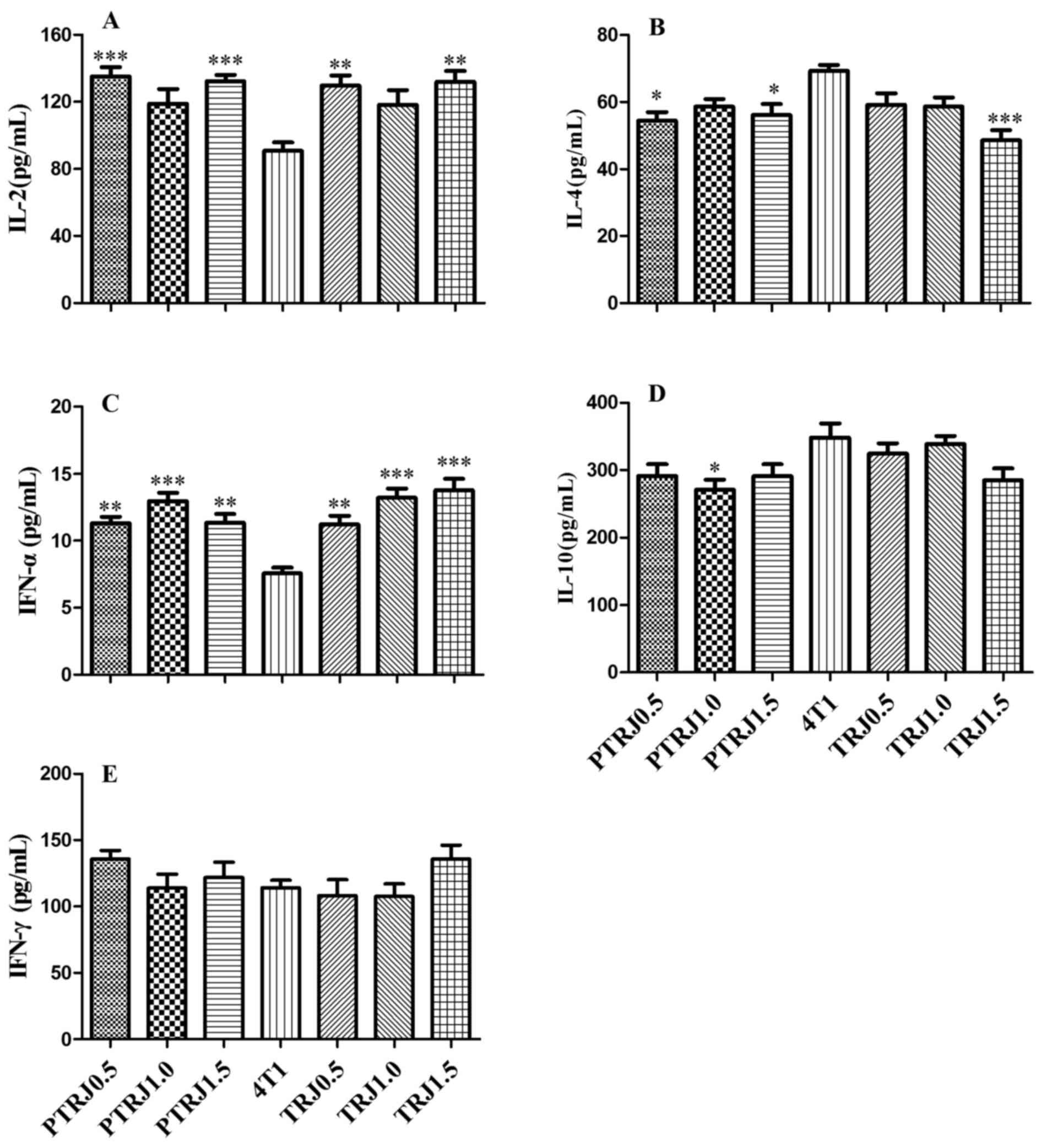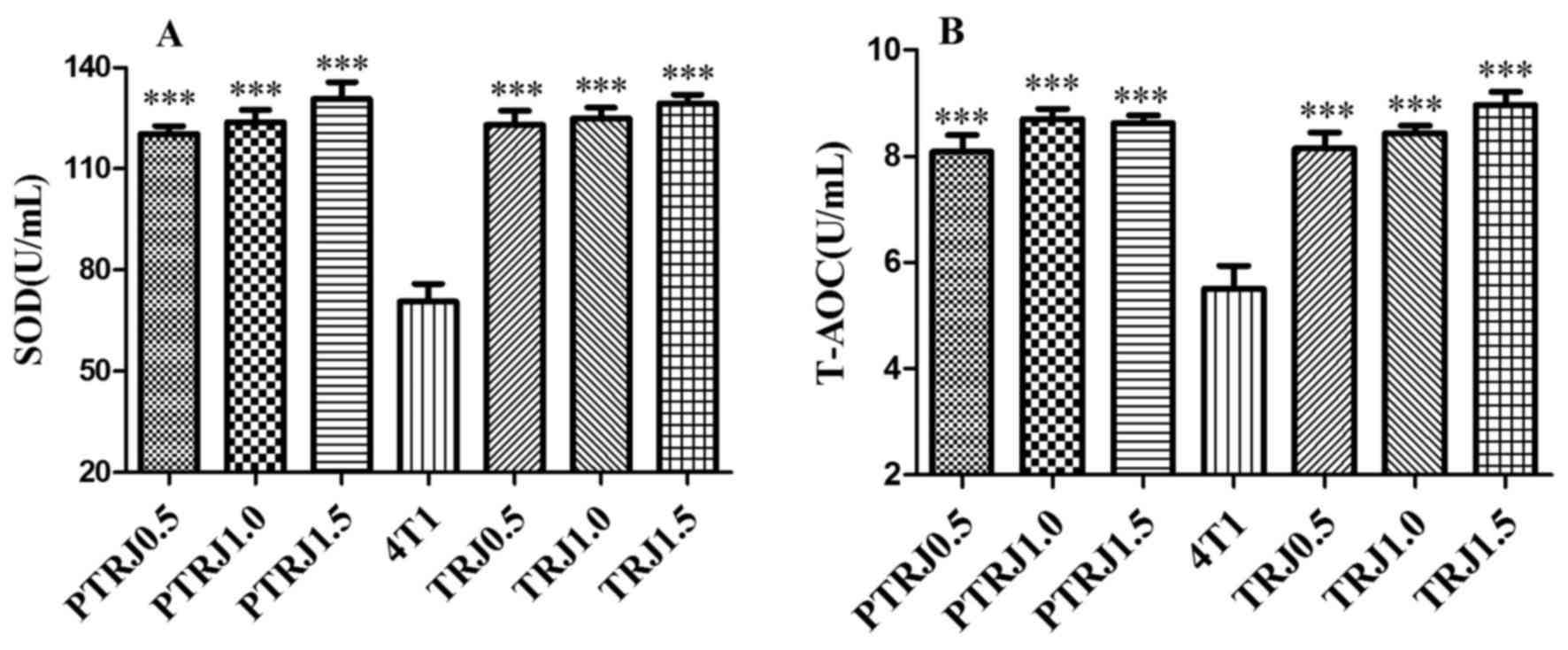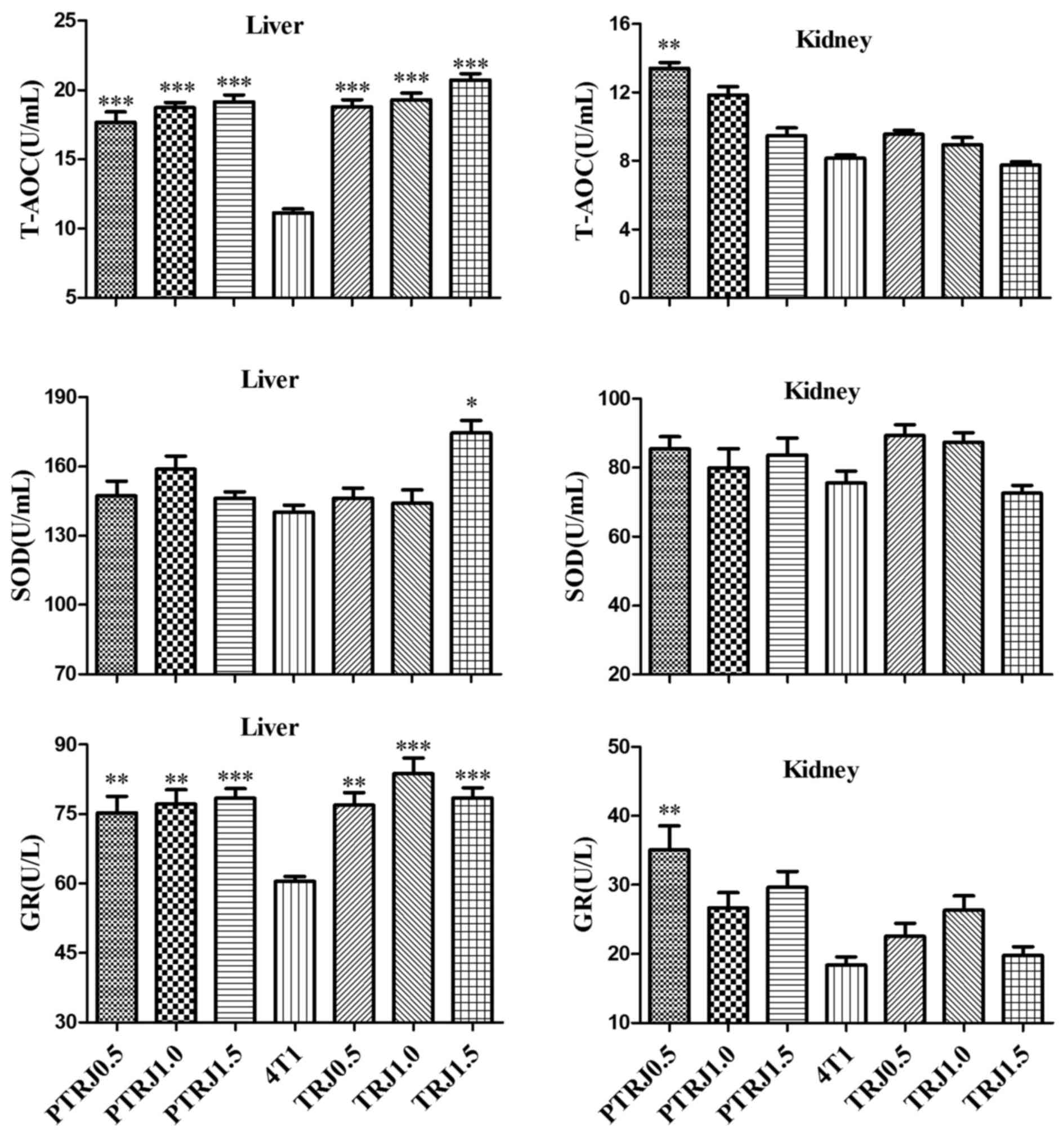|
1
|
Isidorov V, Czyżewska U, Isidorova A and
Bakier S: Gas chromatographic and mass spectrometric
characterization of the organic acids extracted from some
preparations containing lyophilized royal jelly. J Chromatogr B
Analyt Technol Biomed Life Sci. 877:3776–3780. 2009. View Article : Google Scholar : PubMed/NCBI
|
|
2
|
Fujiwara S, Imai J, Fujiwara M, Yaeshima
T, Kawashima T and Kobayashi K: A potent antibacterial protein in
royal jelly. purification and determination of the primary
structure of royalisin. J Biol Chem. 265:11333–11337.
1990.PubMed/NCBI
|
|
3
|
Karaca T, Uz YH, Demirtas S, Karaboga I
and Can G: Protective effect of royal jelly in 2,4,6
trinitrobenzene sulfonic acid-induced colitis in rats. Iran J Basic
Med Sci. 18:370–379. 2015.PubMed/NCBI
|
|
4
|
Arzi A, Olapour S, Yaghooti H and
Karampour Sistani N: Effect of royal jelly on formalin
induced-inflammation in rat hind paw. Jundishapur J Nat Pharm Prod.
10:e224662015. View Article : Google Scholar : PubMed/NCBI
|
|
5
|
Yildirim S, Karadeniz A, Karakoc A,
Yildirim A, Kalkan Y and Şimşek N: Effects of royal jelly on liver
paraoxonase activity in rats treated with cisplatin. Turk J Med
Sci. 42:367–375. 2012.
|
|
6
|
Niu K, Guo H, Guo Y, Ebihara S, Asada M,
Ohrui T, Furukawa K, Ichinose M, Yanai K, Kudo Y, et al: Royal
jelly prevents the progression of sarcopenia in aged mice in vivo
and in vitro. J Gerontol A Biol Sci Med Sci. 68:1482–1492. 2013.
View Article : Google Scholar : PubMed/NCBI
|
|
7
|
Nomura M, Maruo N, Zamami Y, Takatori S,
Doi S and Kawasaki H: Effect of long-term treatment with royal
jelly on insulin resistance in otsuka long-evans tokushima fatty
(OLETF) rats. Yakugaku Zasshi. 127:1877–1882. 2007. View Article : Google Scholar : PubMed/NCBI
|
|
8
|
Kashima Y, Kanematsu S, Asai S, Kusada M,
Watanabe S, Kawashima T, Nakamura T, Shimada M, Goto T and Nagaoka
S: Identification of a novel hypocholesterolemic protein, major
royal jelly protein 1, derived from royal jelly. PLoS One.
9:e1050732014. View Article : Google Scholar : PubMed/NCBI
|
|
9
|
Nakaya M, Onda H, Sasaki K, Yukiyoshi A,
Tachibana H and Yamada K: Effect of royal jelly on bisphenol
A-induced proliferation of human breast cancer cells. Biosci
Biotechnol Biochem. 71:253–255. 2007. View Article : Google Scholar : PubMed/NCBI
|
|
10
|
Salazar-Olivo L and Paz-González V:
Screening of biological activities present in honeybee (Apis
mellifera) royal jelly. Toxicol In Vitro. 19:645–651. 2005.
View Article : Google Scholar : PubMed/NCBI
|
|
11
|
Oršolić N, Terzić S, Šver L and Bašić I:
Honey-bee products in prevention and/or therapy of murine
transplantable tumours. J Sci Food Agric. 85:363–370. 2005.
View Article : Google Scholar
|
|
12
|
Šimúth J, Bíliková K, Kováčová E, Kuzmová
Z and Schroder W: Immunochemical approach to detection of
ddulteration in honey: Physiologically active royal jelly protein
stimulating TNF-alpha release is a regular component of honey. J
Agric Food Chem. 52:2154–2158. 2004. View Article : Google Scholar : PubMed/NCBI
|
|
13
|
Mishima S, Suzuki KM, Isohama Y, Kuratsu
N, Araki Y, Inoue M and Miyata T: Royal jelly has estrogenic
effects in vitro and in vivo. J Ethnopharmacol. 101:215–220. 2005.
View Article : Google Scholar : PubMed/NCBI
|
|
14
|
Suzuki KM, Isohama Y, Maruyama H, Yamada
Y, Narita Y, Ohta S, Araki Y, Miyata T and Mishima S: Estrogenic
activities of fatty acids and a sterol isolated from royal jelly.
Evid Based Complement Alternat Med. 5:295–302. 2008. View Article : Google Scholar : PubMed/NCBI
|
|
15
|
Althuis MD, Fergenbaum JH, Garcia-Closas
M, Brinton LA, Madigan MP and Sherman ME: Etiology of hormone
receptor-defined breast cancer: A systematic review of the
literature. Cancer Epidemiol Biomarkers Prev. 13:1558–1568.
2004.PubMed/NCBI
|
|
16
|
Samavat H and Kurzer MS: Estrogen
metabolism and breast cancer. Cancer Lett. 356:231–243. 2015.
View Article : Google Scholar : PubMed/NCBI
|
|
17
|
Iwase H: Treatment strategy for metastatic
breast cancer with estrogen receptor-positive tumor. Int J Clin
Oncol. 20:249–252. 2015. View Article : Google Scholar : PubMed/NCBI
|
|
18
|
Taavoni S, Barkhordari F, Goushegir A and
Haghani H: Effect of Royal Jelly on premenstrual syndrome among
Iranian medical sciences students: A randomized, triple-blind,
placebo-controlled study. Complement Ther Med. 22:601–606. 2014.
View Article : Google Scholar : PubMed/NCBI
|
|
19
|
Pulaski BA and Ostrand-Rosenberg S:
Reduction of established spontaneous mammary carcinoma metastases
following immunotherapy with major histocompatibility complex class
II and B7. 1 cell-based tumor vaccines. Cancer Res. 58:1486–1493.
1998.PubMed/NCBI
|
|
20
|
Ferlay J, Shin HR, Bray F, Forman D,
Mathers C and Parkin DM: Estimates of worldwide burden of cancer in
2008: GLOBOCAN 2008. Int J Cancer. 127:2893–2917. 2010. View Article : Google Scholar : PubMed/NCBI
|
|
21
|
Luo KW, Ko CH, Yue GG, Lee JK, Li KK, Lee
M, Li G, Fung KP, Leung PC and Lau CB: Green tea (Camellia
sinensis) extract inhibits both the metastasis and osteolytic
components of mammary cancer 4T1 lesions in mice. J Nutr Biochem.
25:395–403. 2014. View Article : Google Scholar : PubMed/NCBI
|
|
22
|
Bincoletto C, Eberlin S, Figueiredo CA,
Luengo MB and Queiroz ML: Effects produced by royal jelly on
haematopoiesis: Relation with host resistance against ehrlich
ascites tumour challenge. Int Immunopharmacol. 5:679–688. 2005.
View Article : Google Scholar : PubMed/NCBI
|
|
23
|
Tamura T, Fujii A and Kuboyama N:
Antitumor effects of royal jelly (RJ). Nihon Yakurigaku Zasshi.
89:73–80. 1987.(In Japanese). View Article : Google Scholar : PubMed/NCBI
|
|
24
|
Shirzad M, Kordyazdi R, Shahinfard N and
Nikokar M: Does royal jelly affect tumor cells ? J HerbMed
Pharmacol. 2:45–48. 2013.
|
|
25
|
Townsend GF, Morgan JF and Hazlett B:
Activity of 10-hydroxydecenoic acid from royal jelly against
experimental leukaemia and ascitic tumours. Nature. 183:1270–1271.
1959. View Article : Google Scholar : PubMed/NCBI
|
|
26
|
Townsend GF, Morgan JF, Tolnai S, Hazlett
B, Morton HJ and Shuel RW: Studies on the in vitro antitumor
activity of fatty acids I. 10-hydroxy-2-decenoic acid from royal
jelly. Cancer Res. 20:503–510. 1960.PubMed/NCBI
|
|
27
|
Male D: Reactions against blood cells and
plateletsInL Immunology. 4th Edition. Roitt I, Brostoff J and Male
D: Mosby; London: pp. 3–23. 1996
|
|
28
|
Liu RM, Zhang XJ, Liang GY, Yang YF, Zhong
JJ and Xiao JH: Antitumor and antimetastatic activities of
chloroform extract of medicinal mushroom cordyceps taii in mouse
models. BMC Complement Altern Med. 15:2162015. View Article : Google Scholar : PubMed/NCBI
|
|
29
|
Murugaiyan G and Saha B: IL-27 in tumor
immunity and immunotherapy. Trends Mol Med. 19:108–116. 2013.
View Article : Google Scholar : PubMed/NCBI
|
|
30
|
Sisirak V, Faget J, Gobert M, Goutagny N,
Vey N, Treilleux I, Renaudineau S, Poyet G, Labidi-Galy SI,
Goddard-Leon S, et al: Impaired IFN-α production by plasmacytoid
dendritic cells favors regulatory T-cell expansion that may
contribute to breast cancer progression. Cancer Res. 72:5188–5197.
2012. View Article : Google Scholar : PubMed/NCBI
|
|
31
|
Sisirak V, Vey N, Goutagny N, Renaudineau
S, Malfroy M, Thys S, Treilleux I, Labidi-Galy SI, Bachelot T,
Dezutter-Dambuyant C, et al: Breast cancer-derived transforming
growth factor-β and tumor necrosis factor-α compromise interferon-α
production by tumor-associated plasmacytoid dendritic cells. Int J
Cancer. 133:771–778. 2013. View Article : Google Scholar : PubMed/NCBI
|
|
32
|
Escobar G, Moi D, Ranghetti A,
Ozkal-Baydin P, Squadrito ML, Kajaste-Rudnitski A, Bondanza A,
Gentner B, De Palma M, Mazzieri R and Naldini L: Genetic
engineering of hematopoiesis for targeted IFN-α delivery inhibits
breast cancer progression. Sci Transl Med. 6:217ra32014. View Article : Google Scholar : PubMed/NCBI
|
|
33
|
Gasic S, Vucevic D, Vasilijic S, Antunovic
M, Chinou I and Colic M: Evaluation of the immunomodulatory
activities of royal jelly components in vitro. Immunopharmacol
Immunotoxicol. 29:521–536. 2007. View Article : Google Scholar : PubMed/NCBI
|
|
34
|
Okamoto I, Taniguchi Y, Kunikata T, Kohno
K, Iwaki K, Ikeda M and Kurimoto M: Major royal jelly protein 3
modulates immune responses in vitro and in vivo. Life Sci.
73:2029–2045. 2003. View Article : Google Scholar : PubMed/NCBI
|
|
35
|
Oka H, Emori Y, Kobayashi N, Hayashi Y and
Nomoto K: Suppression of allergic reactions by royal jelly in
association with the restoration of macrophage function and the
improvement of Th1/Th2 cell responses. Int Immunopharmacol.
1:521–532. 2001. View Article : Google Scholar : PubMed/NCBI
|
|
36
|
Erem C, Deger O, Ovali E and Barlak Y: The
effects of royal jelly on autoimmunity in Graves' disease.
Endocrine. 30:175–183. 2006. View Article : Google Scholar : PubMed/NCBI
|
|
37
|
Cebrian A, Pharoah PD, Ahmed S, Smith PL,
Luccarini C, Luben R, Redman K, Munday H, Easton DF, Dunning AM and
Ponder BA: Tagging single-nucleotide polymorphisms in antioxidant
defense enzymes and susceptibility to breast cancer. Cancer Res.
66:1225–1233. 2006. View Article : Google Scholar : PubMed/NCBI
|
|
38
|
Şener DE, Gönenç A, Akıncı M and Torun M:
Lipid peroxidation and total antioxidant status in patients with
breast cancer. Cell Biochem Funct. 25:377–382. 2007. View Article : Google Scholar : PubMed/NCBI
|
|
39
|
Samy RP, Gopalakrishnakone P and
Ignacimuthu S: Anti-tumor promoting potential of luteolin against
7,12-dimethylbenz(a)anthracene-induced mammary tumors in rats. Chem
Biol Interact. 164:1–14. 2006. View Article : Google Scholar : PubMed/NCBI
|
|
40
|
Karadeniz A, Simsek N, Karakus E, Yildirim
S, Kara A, Can I, Kisa F, Emre H and Turkeli M: Royal jelly
modulates oxidative stress and apoptosis in liver and kidneys of
rats treated with cisplatin. Oxid Med Cell Longev. 2011:9817932011.
View Article : Google Scholar : PubMed/NCBI
|
|
41
|
Jamnik P, Goranovič D and Raspor P:
Antioxidative action of royal jelly in the yeast cell. Exp
Gerontol. 42:594–600. 2007. View Article : Google Scholar : PubMed/NCBI
|
|
42
|
Gómez-Caravaca AM, Gómez-Romero M,
Arráez-Román D, Segura-Carretero A and Fernández-Gutiérrez A:
Advances in the analysis of phenolic compounds in products derived
from bees. J Pharm Biomed Anal. 41:1220–1234. 2006. View Article : Google Scholar : PubMed/NCBI
|
|
43
|
Da Silva RJ, Da Silva MG, Vilela LC and
Fecchio D: Cytokine profile of ehrlich ascites tumor treated with
Bothrops jararaca venom. Mediators Inflamm. 11:197–201. 2002.
View Article : Google Scholar : PubMed/NCBI
|


















